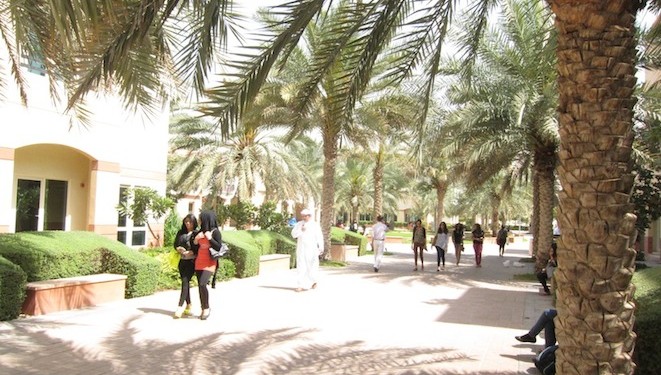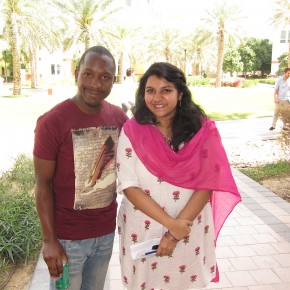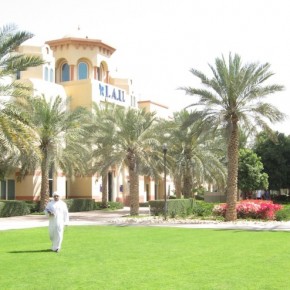For another student, Diom, from Cameroon, it was definitely commercial allure that brought him to Dubai to study at the local campus of Australia’s Murdoch University.
News and business analysis for Professionals in International Education
Have some pie!
What is Dubai’s draw? Commerce, safety and ease of access…

“I thought of Dubai and I thought it would be good to be at the forefront of a country that is an emerging economy,” the BComm in Management student says, underlining that he is “interested in business”.
As for his choice of Murdoch (which like all institutions here operates under a licence and “in partnership with” the Knowledge and Human Development Authority), he says it seemed to place a lot of emphasis on diversity.
“I saw a lot of students from different countries so immediately I felt at home,” he tells me. “There were a lot of African students here. And I had never heard of Kazakhstan before, but now I have got to know it!”
At Amity, Shaikh pinpoints Africa as a key recruitment region, after Gulf Cooperation Council countries and Asia. She says she is soon to visit Nigeria, and interest has been noted from Tanzania and Zimbabwe. Recently returned from Kurdistan, “where Indian education is highly esteemed”, she smiles and states, “We have lots of ambitious plans and a lot of support from our home campus [in India].”
Jones-Khosla confirms that of the 15,000 students DIAC has seen graduate so far, most hail from Asia (84%) and Africa (9%) – although 140 nationalities have passed through in total. She is emphatic about the reason for them studying in Dubai: “For students from GCC Countries (Bahrain, Kuwait, Oman, Qatar, Saudi Arabia and the UAE) and the Asian sub-continent, the number-one reason is ability to get a job,” she states.
“The number-one reason is ability to get a job”
DIAC in fact commissioned Deloitte to produce a Regional Workforce Study which was unveiled this month. This research will be used to orient ongoing development of the education hub to ensure that graduates can plug skills gap required in the region.
Says Dr Ayoub Kazim, Managing Director of TECOM Investments’ Education Cluster: “Armed with this [research], DIAC can refocus its efforts to ensure it is fostering the growth of an education industry that is geared towards the needs of business and a diversified UAE economy.
“We will be able to screen potential academic partners using this evidence in order to emphasise that the courses offered are relevant and serve the needs of business.”
Emmanuel Durou, Consulting Director at Deloitte Middle East, explains that the UAE is forging a reputation in certain industries – such as hospitality and tourism – but other workforce needs were not being met. “There remain some important workforce supply and demand gaps in a number of industries including energy and healthcare,” he notes.
Shaikh at Amity concurs on the point that universities at DIAC want to build reputations for being career-focused. “We make all our graduates ready for the workforce in Dubai, organising work placements even when they are studying,” she says, relating that global companies (such as HSBC, Standard Chartered and Intercontinental Hotel Group) are coming to campus to recruit Amity graduates. In particular, their hospitality & tourism graduates, “as many as we can give!”.
There has been criticism levelled in some quarters about the maturity of the academic environment in Dubai, and in terms of evolution, DIAC still only offers a fledgling range of programmes. Jones-Khosla notes that it is trying to foster a better research culture and will look at encouraging more PhD programmes on campus. Amity is investing in state-of-the-art laboratories for scientific degree programmes, notes Ramachandran.
Developing better critical thinking and problem solving among Emirati students was also required
Pro Vice Chancellor of Murdoch University, Dubai, Professor John Grainger, acknowledged during a session at the Going Global conference that developing better critical thinking and problem solving among Emirati students was also required – as was a need to foster a culture of lifelong learning.
But with job placement rates cited at 100% in some cases (SP Jain) and often 80% and above, Dubai is succeeding in positioning itself as an education hub that has employment aspirations and international outlook firmly embedded in its ethos.
Sanjina, another Murdoch University student born to migrant Indian parents in Dubai, told me, “I wanted to take an international degree because I belong to Dubai. I will definitely stay here.”
Still looking? Find by category:





3 Responses to What is Dubai’s draw? Commerce, safety and ease of access…